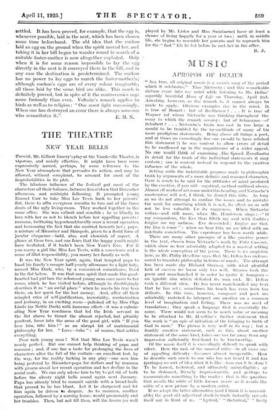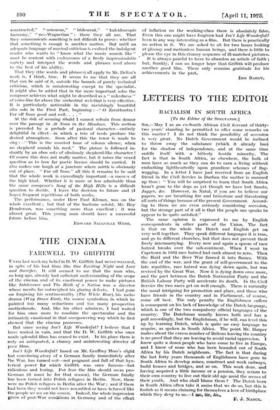MUSIC
APROPOS OF I)ELIUS
• " ALL true, all original music is a swan's song of the period which it celebrates." Thus Nietzsche ; and this remarkable dictum came into my mind while listening to Mr. Delius' superbly beautiful Mass of Life on Thursday, April 2nd. Arresting, however, as the remark is, it cannot always be made to apply. Obvious examples rise in the mind. It is true of Mozart : but of Beethoven ? . . . It is true of Wagner (of whom Nietzsche was thinking throughout the essay in which the remark occurs) : but of Schumann—of Schubert . . . Nietzsche's brain was east in too large a mould to be troubled by the inexactitude of many of his more prodigious statements. Being above all things a poet, and at times an exceedingly fine one (would he have relished this statement ?) he was content to allow errors of detail to be swallowed up in the magnificence of a wider appeal. No one would think of examining Also Sprach Zarathustra in detail for the truth of the individual statements it may contain ; one is content instead to respond to the emotive influence of the whole.
Setting aside the indubitable progress made in'philosophia truth by arguments of a more definite and reasoned character, there is much to be said for the attitudes of mind produced by the emotive, if you will —mystical, method outlined above. Almost all works of art come under this heading, and Nietzsche's masterpiece will not, I think, be denied this title. As long as we do not attempt to confuse the issues and to mistake the work for something which it is not, its effect on us will not be less valuable far its vagueness. When Nietzsche writes—and still more, when Mr. Henderson sings :—" 0 my companions, the Eve thus fiileth my soul with doubts ; forgive me my sadness. Eve descended ; forgive me that the Eve is come " : when we hear this, we are filled with an indefinite conviction. The experience has been worth while.
There are many other passages of a like emotive power in the text, chosen from Nietzsche's work by Fritz Cass'rer, which show us how admirably adapted to a musical setting is the whole conception of the poem. There is na suspicion here, as Mr. Philip Heseltine says, that Mr. Delius has endeav- oured to translate philosophy in terms of music. The attempt has been made (by Richard Strauss), with what plentiful lack of success we know only too well. Strauss took the poem and man-handled it in order to epaler le bourgeois— an ignoble aim which defeated its own end. Mr. Delius took a different view. He has never nun-handled any text that he has set : sometimes his touch has even been too delicate. In this case, however, composer and poet are admirably matched to interpret one another on a common level of imagination and feeling. There was no need of translation ; they speak a language that is essentially the same. There would not seem to be much value or meaning to be attached to Mr. 1Leseltine's further statement that the work is " an epic of initiation of the bringing to birth of God in man." The phrase is very well in its way ; but a frankly emotive statement, such as this, about another statement of the same kind, takes one too far away from any impression sufficiently first-hand to be trustworthy.
Of the music itself it is exceedingly difficult to speak with effect. Here the task of the musical critic—in all cases one of appalling difficulty—becomes almost insuperable. How to describe such music to one who has not heard it and has (perhaps) no sort of idea what it is like--how can it be done ? To be honest, technical, and ultimately unintelligible ; or to be dishonest, literaly impressionistic, and perhaps to communicate something to the reader : that is the question that assails the critic of little known music as it assails the critic of a new picture by a modern artist.
If we adopt the latter alternative (and I think it is unavoid- able) the good old adjectival stock-in-trade instantly spreads itself out in front of us. " Lyrical," " rhetorical," " freely constructed," " sensuous," " iridescent," " kaleidoscopic harmony," " neo-Wagnerian " : there they all are. That they communicate something is not difficult to prove : whether that something is enough is another matter. But until an adequate language of musical criticism is evolved the indulgent reader who wants to " know what the music sounds like" must be content with endeavours of a freely impressionistic variety and interpret the words and phrases used above to the best of his ability.
That they (the words and phrases) all apply to Mr. Delius's work is, I think, true. It seems to me that they are all that can be said of it, outside the bounds of purely technical criticism, which is uninteresting except to the specialist. It might also be added that in the more important solos the composer achieves what might be described as a " nakedness " of voice-line far above the orchestral web that is very effective. It is particularly noticeable in the ravishingly beautiful alto solo in the First Part, beginning :—" 0 Zarathustra ! Far off from good and evil. . . . "
At the risk of seeming ribald I cannot refrain from demur over the passage in At Noon in the Meadows. This section is preceded by a prelude of pastoral character—entirely delightful in effect—in which a trio of reeds produce the desired atmosphere. Soon after this the tenor is made to sing :—" This is the coveted hour of solemn silence, when no shepherd sounds his reed." The phrase is followed in- stantly by an oboe solo of obviously shepherd-like character ! Of course this does not really matter, but it raises the vexed question as to how far poetic licence should be carried. It also makes one laugh at a juncture where mirth is obviously out of place. " Far off from " all this it remains to be said that the whole work is exceedingly important—a success of the high kind. Whether it is more or less admirable than the same composer's Song of the High Hills is a difficult question to decide. I leave the decision to future and (I hope) frequent repetitions of both works.
The performance, under Herr Paul Klenan, was on the whole excellent ; but that of the baritone soloist, Mr. Roy Henderson, was something more than excellent : it was almost great. This young man should have a successful future before him.
EDWARD SACKVILLE WEST.











































 Previous page
Previous page